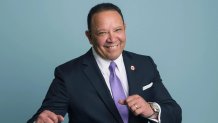Marc H. Morial is president and chief executive officer of the National Urban League, the nation's largest historic civil rights and urban advocacy organization. Morial has championed equality, youth initiatives and economic empowerment programs as NUL president. The New Orleans native served as mayor of his hometown from 1994 to 2002 and ushered in a renaissance for the city. Morial is an undergraduate of the University of Pennsylvania and earned his law degree from Georgetown University.
This is the first part of a series where civil rights leaders, cultural influencers, advocates and critical thinkers explain race relations, societal change, community protest and the political awakening happening in the United States following the tragic deaths of George Floyd, Breonna Taylor, Ahmaud Arbery and other Black Americans. The group, including NAACP President Derrick Johnson and #OscarsSoWhite Creator April Reign, pose their thoughts on race relations during the summer of 2020 and how America may move forward less divided. Join the conversation on social media using #PassTheMic.
Marc Morial, President of National Urban League

The nation simply can no longer deny the racial violence that African Americans live with every day, and there is no turning back.
Marc Morial
Q: How would you describe the civic unrest occurring in America right now?
A: The pandemic pulled back the curtain of the nation’s supposedly great economy to reveal the deep and abiding racial disparity that afflicts us. The trauma of the deadly virus rubs against the indignity of economic inequality which rings against the anguish of police brutality, like tectonic plates until the tension is released.
Q: Is this a fleeting moment or have we reached an inflection point where lasting change is possible?
A: This is a generational change. In the 1960s, television changed the course of history by beaming images of racist violence into America’s living rooms. Now, cell phone cameras are doing that work. The nation simply can no longer deny the racial violence that African Americans live with every day, and there is no turning back.
Q: Is there another moment in history that relates to the moment we are living through now?
A: As I said in my testimony to the House Judiciary Committee (last month), Congress must decide whether this is a 1922 moment or a 1965 moment. In 1922, the Senate filibustered anti-lynching demonstration and after 200 attempts and almost a century, we still have no federal anti-lynching law. In 1965, the murders and bearing of civil rights workers trying to register golfers spurred Congress to pass the Voting Rights Act. This is one of those moments.
Q: What specifically needs to happen for Black lives to matter in the United States?
A: America needs to confront and repair the structural inequalities in our economic and criminal justice system. The Black lives that end in an instant during a confrontation with police are not the only Black lives that are senselessly lost. We lose lives to mass incarceration. To inherent bias among medical providers. To a lack of access to health insurance. To underfunded and neglected public schools. These Black lives matter too.
Q: What does social justice mean to you personally and why should others care?
To paraphrase Martin Luther King’s most famous line, it means people are judged by the content of their character. It’s the unfettered right to Life, Liberty and the pursuit of Happiness. People should care because when one person’s rights are threatened, all people’s rights are threatened.
Q: What solutions will heal racial divisions and disparities?
The Justice in Policing Act. Restoring the Voting Rights Act. Desegregating our schools. The ongoing national dialogue that’s taking place in both traditional and social media is unprecedented.
Q: How do you feel about the future?
A: Extremely hopeful. My parents built a better world for my siblings and me, and I’m working to build a better one for my children. When you have children you can’t help but be optimistic because you know they’re going to make the world even better than my parents or I have.

